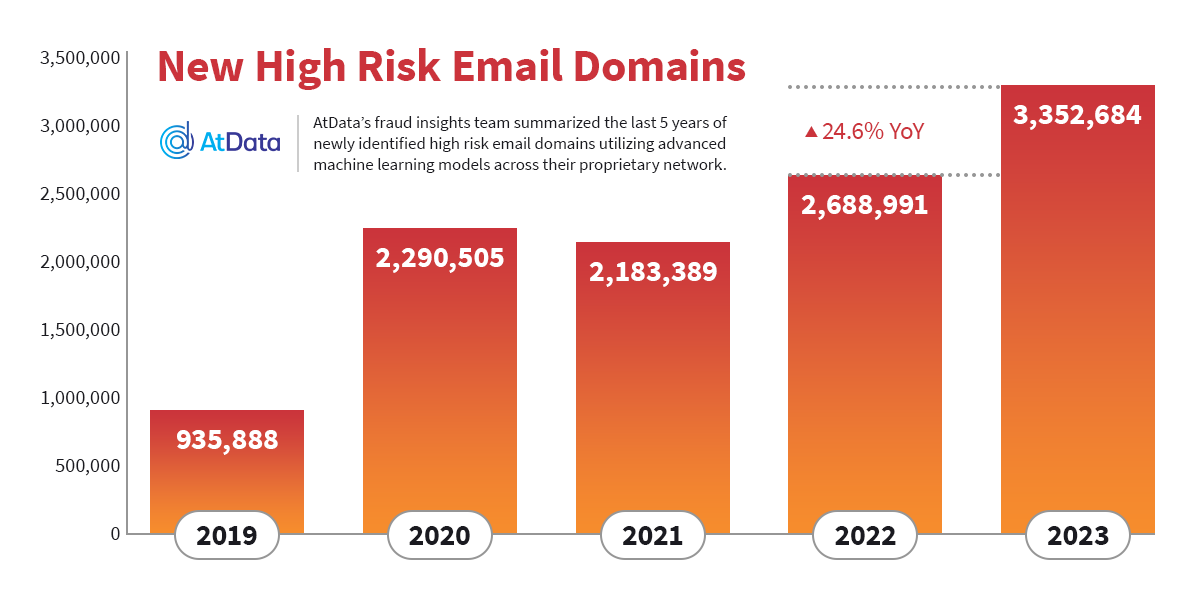In today’s digitally connected world, email has become an integral part of our digital identity, both personally and professionally. However, the influx of spam, unwanted newsletters, and privacy concerns have led to the rise of disposable email addresses as a potential solution. These temporary, throwaway email addresses offer certain advantages, but they also come with their own set of drawbacks.
Over the past few years there has been a large rise in use of certain high risk and disposable domains for fraudulent purposes. In this article AtData delves into the world of disposable emails, exploring their benefits, drawbacks, and how fraudsters have adopted them as a firm favorite.
The Benefits of Disposable Email Addresses
- Spam Reduction: One of the primary reasons individuals use disposable email addresses is to shield their primary email accounts from spam. By using a temporary address for signing up on websites or services, users can prevent their main inbox from getting inundated with unwanted emails.
- Privacy Protection: Disposable emails help maintain user privacy by not revealing personal information. This is particularly useful when obtaining promotions and or coupons online, or participating in contests, where users might be hesitant to share their real email addresses.
- Account Verification: Some platforms require email verification during account creation. Disposable email addresses can be used to verify accounts without exposing your main email, making the verification process more secure and convenient.
- Temporary Communication: When you need to communicate with someone or a service for a short period, disposable emails provide a way to do so without divulging your permanent email address.
Drawbacks of Disposable Email Addresses
- Limited Longevity: As the name suggests, disposable email addresses are designed for short-term use. This can be a drawback if you need to receive important information or updates over an extended period.
- Delivery Issues: Some platforms might block or reject emails from disposable addresses, which could lead to missed communications or difficulties in account verification.
- Not Ideal for Personal Contacts: While disposable emails work well for online interactions, they are not suitable for maintaining personal or professional relationships.
- Security Concerns: Relying solely on disposable email addresses might lead to security lapses, as they can be easily accessible by anyone who knows the address. This could be exploited to gain unauthorized access to accounts.
Why Fraudsters Use Them
Fraudsters are increasingly using disposable email addresses as part of their tactics to engage in various fraudulent activities. Disposable email addresses are temporary email accounts that can be created quickly and used for a short period of time.
- Anonymity: Disposable email addresses allow fraudsters to remain anonymous when signing up for online services, making purchases, or engaging in other activities that require an email address. This anonymity makes it harder to trace their actions back to them.
- Avoiding Verification: Many online platforms and services require email verification to create an account. Fraudsters can use disposable email addresses to bypass this requirement, making it easier to set up fraudulent accounts.
- Phishing: Fraudsters use disposable email addresses to send phishing emails. They can create convincing-looking emails that appear to be from legitimate organizations to trick recipients into clicking on malicious links or providing sensitive information.
- Temporary Communications: When engaging in fraudulent transactions or scams, fraudsters may use disposable email addresses to communicate with their victims. After the scam is complete or if they are detected, they can simply discard the disposable email address, making it difficult for victims to contact them or track them down.
- Spam and Bulk Registrations: Some fraudsters use disposable email addresses to sign up for numerous online services or register multiple fake accounts in bulk. This can be used for spamming, spreading malware, or conducting other malicious activities on a large scale.
- Evading Bans and Blocks: If a fraudster’s actions lead to their email address being banned or blocked by a website or service, they can easily create a new disposable email address to continue their activities without interruption.
AtData’s fraud services utilizes the most advanced identification and classification models in the industry allowing our customers to instantly identify and block suspicious or disposable email addresses from creating accounts or transacting within their business.
Learn more about AtData’s fraud prevention.
 Affiliate Marketing
Affiliate Marketing Automotive
Automotive eCommerce and Retail
eCommerce and Retail FinTech
FinTech LeadGen
LeadGen Nonprofit and Political
Nonprofit and Political Payments
Payments Technology Platforms
Technology Platforms Tourism and Hospitality
Tourism and Hospitality

